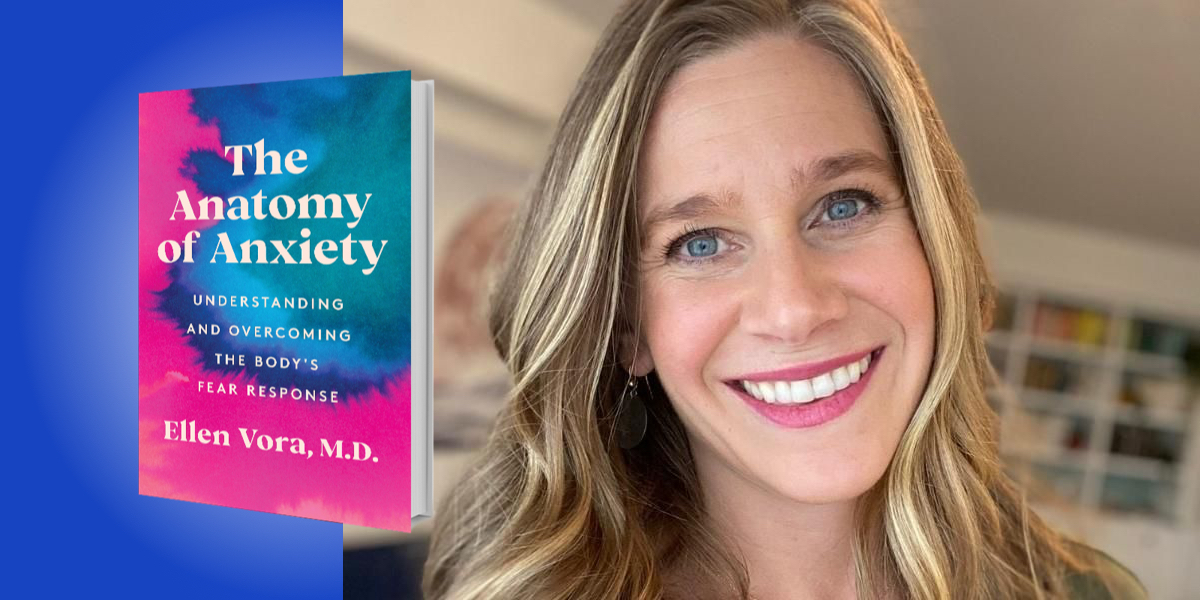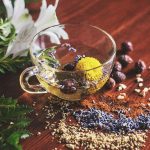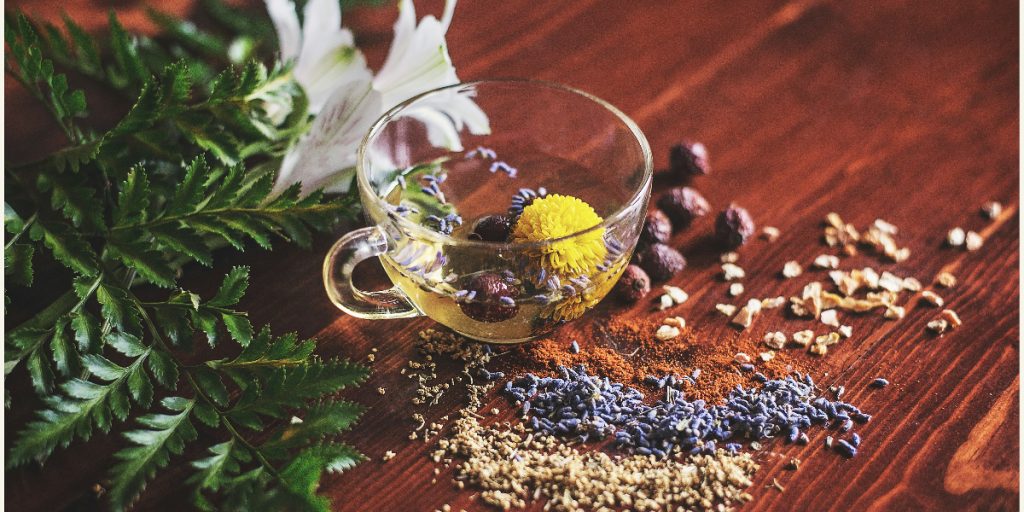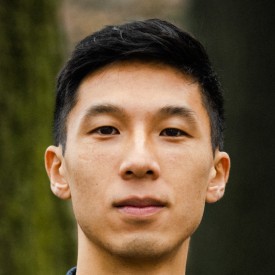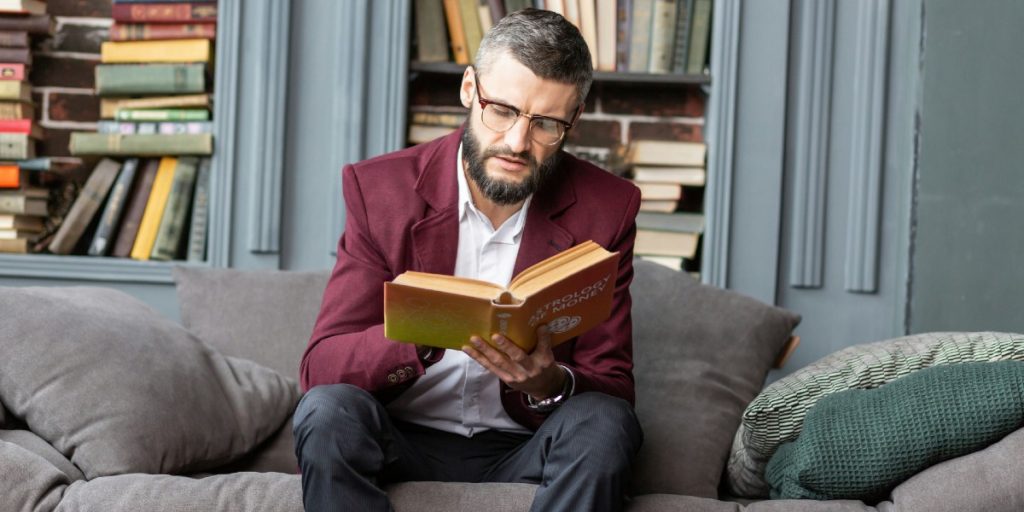Ellen Vora, MD received her B.A. from Yale University and attended Columbia University medical school. She’s a board-certified psychiatrist, medical acupuncturist, and yoga teacher. Dr. Vora takes a functional medicine approach to mental health—considering the whole person and addressing imbalance at the root, rather than reflexively prescribing medication. In addition to her private practice and speaking engagements, Dr. Vora also consults for healthcare startups.
Below, Ellen shares 5 key insights from her new book, The Anatomy of Anxiety: Understanding and Overcoming the Body’s Fear Response. Listen to the audio version—read by Ellen herself—in the Next Big Idea App.
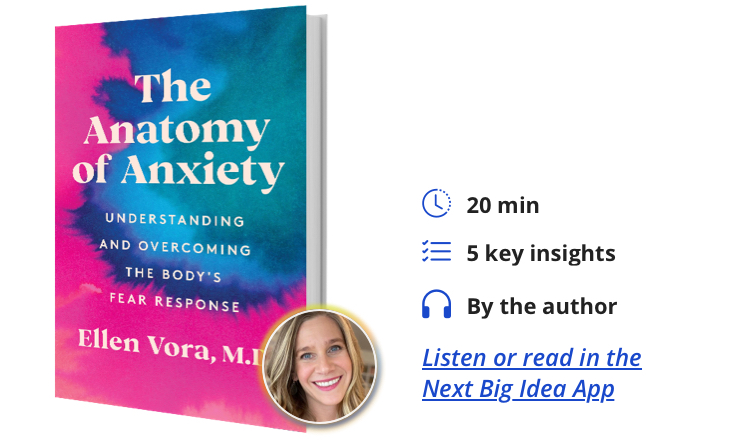
1. Anxiety is not all in your head—it’s in your body.
For decades, we have been indoctrinated to believe that mental health is the result of a genetically determined chemical imbalance in the brain. What I have come to understand through years of practice is that issues that we’d once considered purely psychiatric in nature can be better understood as the result of a delicate yet highly consequential interplay of body and mind.
I have found that the anxiety that plagues so many of us is increasingly caused by the habits that are now intrinsic to our modern lives, such as chronic sleep deprivation, poor nutrition, and even doom scrolling on social media late into the night. Though these issues may seem too benign to significantly affect the mind, they are capable of creating a stress response in the body, which prompts the release of hormones such as cortisol and adrenaline—signaling a state of emergency to the brain that can leave us feeling anxious. In other words: mental health is physical health. And anxiety—that hypervigilant feeling that escalates swiftly to a sense of catastrophe and doom—is as grounded in the body as it is in the mind.
So while brain chemistry and thought patterns do play a role in anxiety, I would argue that these are actually downstream effects—meaning that frequently our brain chemistry changes as a result of an imbalance in the body. And this is a hopeful message! In understanding that the body is as capable of informing our moods as the brain is, we have come to realize that our anxiety is far more preventable than previously known. That is, through relatively straightforward adjustments to our diet and lifestyle, we can avoid unnecessary stress responses and head anxiety off at the pass.
I draw a distinction between two types of anxiety: false and true anxiety. This is not a diagnosis but rather an interpretation that I have found has helped my patients target the source of their anxiety, and more swiftly identify the steps that need to be taken to address it.
False anxiety is avoidable anxiety. True anxiety, on the other hand, is purposeful anxiety. False anxiety occurs when a stress response is precipitated by a seemingly benign aspect of modern life, like a blood sugar crash or strong coffee. At these times, our minds are all too happy to swoop in with an explanation. Our brain says, Maybe I’m anxious because my boss’s aloof email seems to suggest I’m underperforming at work. Our minds are meaning-makers—give us a picture of two dots and a line, and the mind sees a face; give us a hangover and a cold brew in lieu of breakfast, and then we think we’re in trouble at work, our relationship is falling apart, and the world is barreling toward certain destruction, because our minds like to tell us stories that explain our physical sensations. But if we could omnisciently know what was going on under the surface in that moment, we would discover that our mood was precipitated by a state of physical imbalance. And much of our worry is just this: our mind trying to justify a stress response in the physical body.
“In understanding that the body is as capable of informing our moods as the brain is, we have come to realize that our anxiety is far more preventable than previously known.”
Indeed, sleep deprivation, chronic inflammation from eating foods you don’t tolerate, and the comment section in Twitter—these are all, from your body’s perspective, indications that your environment is not safe. As such, diet and lifestyle factors are critical contributors to our mental health, given that they can trip the body into a stress response. Our genes and thoughts do, of course, have sway over our moods, but our daily habits are the real determinants of much of our anxiety. And intervening at the level of the body, when indeed the source of a person’s anxiety is physical, is often quicker, less expensive, and more effective.
Anxiety is not the final diagnosis, but rather the beginning of our inquiry. That is, anxiety is not what’s wrong with you—it is your body and mind fiercely alerting you to the fact that something else is wrong. False anxiety is common, it causes immense suffering, and it’s mostly avoidable. By widening the lens of our understanding to encompass not only the aspects of anxiety that occur in the brain but also those that originate in the body, we can more effectively address our current, and vast, mental health epidemic.
2. Anxiety is what we eat and drink.
We are living in the wake of decades of misleading and contradictory nutrition recommendations. Rather than passing on traditional food wisdom from generation to generation, as was the case with indigenous tribes, American food “wisdom” is a pyramid of serving-size recommendations heavily influenced by industry funding. I have observed that many of my patients exist somewhere along a spectrum from being addicted to the drug-like foods (gluten, dairy, sugar, and processed foods, engineered to be hyperpalatable), to an orthorexic tendency to obsess about and fear food, declining social invitations in a counter-therapeutic attempt to heal their anxiety by tightly controlling their diets.
Here are 4 ways our habits around food and beverages impact our anxiety:
1. Blood sugar: Given that the modern food landscape is built on a foundation of coffee drinks (which are secretly milkshakes) and rosé all day, many of us are riding the blood sugar roller coaster, with our blood sugar swinging up and down throughout the day. And every blood sugar crash generates a stress response, which can feel identical to anxiety. If you’re familiar with the experience of being “hangry,” then you probably also get “hanxious,” meaning you get anxious when your blood sugar is low. These blood sugar crashes are a largely avoidable cause of anxiety, and I’ve found adjustments to blood sugar to be among the most immediate and effective salves for anxiety.
2. Caffeine: To be clear, caffeine is not inherently bad. However, just as with blood sugar crashes, when we ingest caffeine, it promotes the release of cortisol, which revs up the sympathetic response. In other words, caffeine makes our nervous system ready for a fight. Then if we introduce a stressor—say, a difficult commute or an unsettling work email—we have a more pronounced reaction to that stress. Before you know it, your heart is pounding, your hands are tremulous, your body feels shaky, and your mind gets trapped in a ruminative spiral.
I realize that the idea of quitting coffee may be giving you anxiety right about now. Indeed, coffee sometimes feels like the only reliable joy in our day, and our one true friend in the world. But remember that caffeine feels so good, in part, because it’s the antidote to its own withdrawal—we wake up in caffeine withdrawal, and then coffee gets the credit for being the salvation to the very problem it created! Fortunately, there are ways to wean ourselves off caffeine without undue suffering. The key is to go very gradually.
“Alcohol chills us out temporarily, but in the end, it leaves us feeling more anxious than we were to begin with.”
3. Alcohol: Humans have long used alcohol to self-medicate for anxiety, and for good reason—it works. In the short run, at least. As with benzodiazepine medications such as Xanax, alcohol modulates the activity of the neurotransmitter GABA—the primary inhibitory neurotransmitter in the central nervous system. When we drink, we experience a rush of GABA in our synapses, and this feels good, pleasant, relaxing. Suddenly the things we were so wound up about no longer feel like such a big deal.
But the body doesn’t really care whether or not we’re relaxed; it just wants us to survive. So when we’ve had a glass or two of wine, the body becomes aware that if a leopard came around the corner, we’d be too buzzed to care. The brain then goes to great lengths to restore homeostasis—the original state of balance. It does this by reabsorbing GABA and converting it into glutamate, an excitatory neurotransmitter. The resulting feeling is anxiety. Alcohol chills us out temporarily, but in the end, it leaves us feeling more anxious than we were to begin with. And this effect can accumulate over time, so it’s easy to see how alcohol creates the need for itself, looping us into a vicious cycle.
4. Micronutrient deficiencies: Finally, many of us are anxious because we’re deficient in critical nutrients. In the U.S., our relationship with food has become so fraught that we have nearly forgotten the connection between food and nourishment. The fact is that the functioning of our brains rests on whether our food provides the necessary raw materials. When we’re well-nourished, we feel good. And when we rely on nutritionally bankrupt processed foods, we are left overfed but undernourished, and feeling anxious. To get the necessary nutrients from our diet, we need to eat a wide variety of nutrient-dense foods.
3. Can anxiety save us all?
Sometimes you can fine-tune and optimize every aspect of your physiology, but you’re still left with discomfort or an inability to relax or feel optimistic about your life. This is true anxiety, which we can think of as an emotional compass telling us, Something is not OK. This anxiety is not something to pathologize, and these sensations and emotions aren’t something we should attempt to eradicate, nor could we if we tried. These true anxieties pertain to our insights, our traumas, and our deepest sense of vulnerability and purpose. When we understand that our anxiety has important information to offer, a crucial shift occurs. Our uneasy feelings are no longer the enemy or something to vanquish—they become our tools and allies instead.
Culturally, we’ve been taught to view anxiety as a nuisance, something to be suppressed into submission—but when we do this, we can miss out on critical guidance. Instead of asking, How can I stop feeling so anxious?, we should be asking, What is my anxiety telling me? True anxiety serves as a course correction, nudging us back onto our paths; and it doesn’t just operate on a personal level, but also on a societal level.
“Instead of asking, How can I stop feeling so anxious?, we should be asking, What is my anxiety telling me?”
Just like humans, primates also exist along a spectrum of being more or less sensitive and prone to anxiety. In the 1980s, the late zoologist Dian Fossey decided to remove the more sensitive members of one group of chimpanzees to see how it would affect the rest of the community. Six months later, all the chimps were dead. It turns out, the sensitive chimps served a critical role—they were the advance warning system for the tribe, the ones noticing when there was about to be a storm or an elephant stampede.
So if you are one of the more attuned, anxious members of the human race—if your nervous system is dialed a little higher than others—society owes you support and gratitude, because in important ways, your anxiety exists to protect us all. Instead of telling the anxious among us to “stop being so sensitive,” we should honor what they have to say. In fact, the more every one of us embraces our true anxiety, the more valuable we are to our world. True anxiety does not just guide us on our own path, but it also assigns us a larger mission. Our true anxiety can place us on the front lines, alerting others to threats that may be just out of view. The collective voice of true anxiety shepherds us in the right direction as a society.
And objectively, the world needs to change. It is critical that we shift from pathologizing and suppressing this anxiety to heeding its urgent messages. We need to listen to those with their ears to the ground, who sense the subtle—and not so subtle—dangers on the horizon. They are our prophets, and they may just wake us all up in time.
4. The banality of fear: Your anxiety is for sale.
When it comes to understanding anxiety, we have to understand that we are living in the “attention economy.” That is to say, our attention is the commodity being competed for by very smart companies—and they’ve done their homework. They know their neuroscience and behavioral psychology, and they know that if they prey on our fear response, or instill uncertainty, doubt, or controversy, we’ll rubberneck and give them an increasingly large share of our attention. These companies achieve their end, which is more clicks and ad revenue, but our mental health is the collateral damage.
This insight, that fear grabs and holds our attention, contributes to our anxiety epidemic in another important way. We are bathed in fear for the banal reason that marketers are using fear to try to sell us their products. In addition to our current heavy-duty societal causes of anxiety—from systemic racism to climate change—and the many intimate reasons that we live in a state of worry, like concerns about our families, health, and finances, there is also the fear that we are constantly bathed in, and it comes from advertising. Forget sex—large corporations have figured out that fear and anxiety sell. As David Foster Wallace writes in Infinite Jest, “It did what all ads are supposed to do: create an anxiety relievable by purchase.”
“We are bathed in fear for the banal reason that marketers are using fear to try to sell us their products.”
Since contentment and self-acceptance don’t exactly inspire rampant consumerism, our insecurities are carefully curated and reflected back to us, instilling uncertainty and driving us to consume. As we scroll through our targeted advertisements on social media, we repeatedly encounter the message that we’re not enough, we’re in danger, and something urgently needs fixing. As a result, we go through our lives bathed in fear—not necessarily for a deep, sinister reason, but simply because clever marketers are trying to make a buck. Our anxiety epidemic has been amplified by something as banal as marketing strategy.
The solution is to begin to take notice anytime you’re being sold something. This awareness can act like a force field, preventing you from getting swept up in the anxiety-provoking messaging that was merely trying to scare you into buying something you don’t need.
5. We’re in a silent epidemic of psychiatric medication withdrawal.
The U.S. is the most medicated country in the world, and we have seen a recent precipitous rise in prescriptions for psychiatric medications since entering the pandemic. As some of the millions of people on psychiatric medication inevitably decide to discontinue their meds for one reason or another, what I’m witnessing is that there are legions of people in the midst of withdrawal who are experiencing such symptoms as insomnia, irritability, depression, anxiety, something called “brain zaps,” and even suicidal thoughts. They feel alone in this experience, and struggle to find support or appropriate guidance from doctors.
This situation is made even more difficult by the fact that psychiatrists are not even taught how to help people get off these drugs; in fact, most deny the very idea that getting off psych meds can cause withdrawal. In our training, we’re instructed that if a patient becomes symptomatic soon after getting off their antidepressant—exhibiting signs of increased anxiety, panic, insomnia, crying spells, or worsening mood—this should be considered a relapse, as opposed to withdrawal.
We currently have an epidemic of people experiencing withdrawal symptoms upon discontinuation, without knowing they should attribute these symptoms to their medication. Instead, they either blame themselves or their life circumstances, or simply see it as a relapse—and an indication that the medication was helping. It’s important for people to realize that becoming symptomatic in the wake of decreasing the dose of a psychiatric medication is not necessarily an indication of relapse. It is withdrawal. And it can and should be supported through a variety of measures that help the body move through the withdrawal process more smoothly.
For anyone contemplating getting off psych meds and feeling discouraged that there’s a withdrawal state involved with that process, know that it’s never hopeless. Our brains are quite plastic and adaptable. This is what brains do: they learn. They learn to rely on meds, and they can also learn to restore and rebuild after meds. There is always hope.
To listen to the audio version read by author Ellen Vora, download the Next Big Idea App today:











